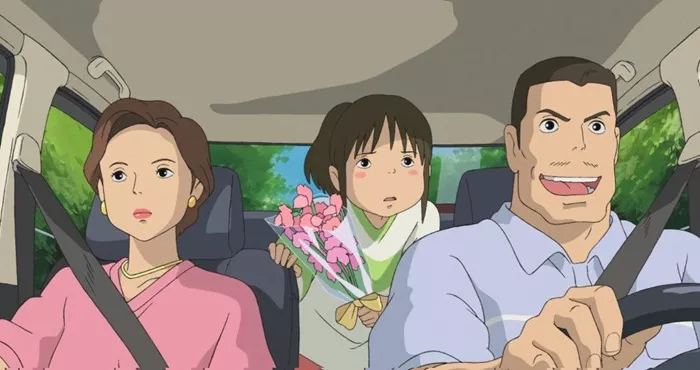Spirited Away,” directed by the legendary Hayao Miyazaki and produced by Studio Ghibli, is one of the most celebrated animated films in cinema history. Released in 2001, it won numerous awards, including the Academy Award for Best Animated Feature. The film is not just a simple tale of adventure and fantasy; it weaves complex themes of greed, identity, and transformation, deeply embedded in Japanese culture and Shinto beliefs. One of the most striking scenes that sets the stage for these themes is the transformation of Chihiro’s parents into pigs. This article explores the symbolic and narrative significance of this transformation and its implications within the broader context of the film.
Plot Overview: Setting the Stage
“Spirited Away” follows the story of a young girl named Chihiro who, while moving to a new neighborhood, stumbles into a magical world ruled by witches and spirits. Early in the film, Chihiro’s parents, Akio and Yuko Ogino, are transformed into pigs after consuming food meant for the gods. This pivotal moment is not just a plot device but serves as a critical symbol reflecting the film’s core themes.
Cultural and Mythological Foundations
Shinto Influences and the Spirit World
Japanese Shinto beliefs play a significant role in “Spirited Away.” The film portrays a world teeming with kami (spirits) of every ilk, which is reflective of the Shinto view that every element of the natural world possesses a spirit. Chihiro’s journey takes place in a liminal space that bridges the human world and the spirit world, where the actions of humans have direct consequences.
The Sin of Gluttony and Its Punishments
In many cultures, gluttony is considered one of the seven deadly sins, and similar concepts exist in Japanese folklore. The transformation of Chihiro’s parents into pigs symbolizes the consequences of overindulgence and greed. Pigs often represent gluttony and ignorance in various mythologies, making this transformation a fitting punishment.
Symbolism in Miyazaki’s Narrative
Food as a Symbol in Ghibli Films
Food plays a symbolic role throughout many Studio Ghibli films. In “Spirited Away,” food acts as both a sustenance and a trap. The enchanted food eaten by Chihiro’s parents is delicious yet dangerous, emphasizing the idea that indulgence in excess, without awareness, leads to downfall.
Transformation as Punishment
The transformation theme in “Spirited Away” serves multiple functions. It is a punishment for the parents but also initiates Chihiro’s transformation from a sullen, reluctant child into a responsible, brave young woman. This change is mirrored in her parents’ physical transformation, reflecting the consequences of their actions and setting the stage for Chihiro’s personal growth.
Analyzing Chihiro’s Parents: A Character Study
Akio and Yuko Ogino’s Character Traits
Chihiro’s parents are portrayed as somewhat careless and dismissive of Chihiro’s apprehensions, symbolizing adult disregard for the spiritual and natural world. Their transformation into pigs is Miyazaki’s critique of modern society’s consumerism and materialism, which often leads to spiritual emptiness and moral decay.
Moral Lessons and Parental Figures
The transformation also serves as a moral lesson not just to Chihiro but to the audience. It warns against the dangers of losing one’s self to hedonistic pursuits and highlights the importance of respect and awareness of one’s environment.
The Impact of Transformation on Chihiro
Initiation into the Spirit World
The immediate consequence of her parents’ transformation is Chihiro’s thrust into the spirit world, compelling her to adapt, survive, and save her parents. This ordeal is her rite of passage, which is a common theme in coming-of-age stories.
Chihiro’s Growth and Development
Chihiro’s evolution from a passive, scared child to a proactive, compassionate individual is accelerated by the crisis triggered by her parents’ transformation. She learns to work, to care for others, and to value friendship and loyalty over materialistic gains.
Thematic Implications of the Transformation Scene
Critique of Society
Miyazaki uses the transformation of Chihiro’s parents as a critique of contemporary Japanese society, echoing Japan’s historical context of rapid economic growth followed by stagnation. The film subtly comments on the consequences of societal greed and the disconnect from traditional values.
Environmental and Spiritual Disconnect
There’s also a pronounced theme of environmental crisis and spiritual disconnect in the film. The transformation scene symbolizes humanity’s consumption and the assumed entitlement to the resources of nature, paralleling real-world ecological issues.
Conclusion: The Enduring Legacy of Chihiro’s Journey
The transformation of Chihiro’s parents into pigs in “Spirited Away” is laden with deep cultural, spiritual, and moral significance. It sets the narrative and thematic tone for the entire film, serving as a cautionary tale against greed and a narrative catalyst for Chihiro’s transformational journey. Through this magical and at times harrowing adventure, Miyazaki not only entertains but educates, making “Spirited Away” a timeless piece that continues to resonate with audiences around the world. This detailed exploration into one of the film’s pivotal scenes helps to appreciate the intricate craftsmanship of Miyazaki and the profound messages embedded within this masterful animation.


